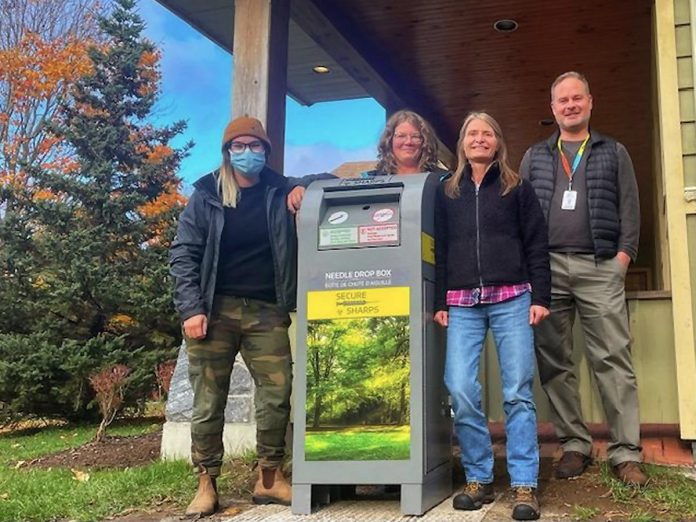
Six new needle disposal bins are available in the City of Kawartha Lakes, Haliburton County, and Northumberland County, with an seventh one coming soon.
The locations of the bins, available 24/7 and intended to reduce accidental contact with used needles, were selected in a partnership between Haliburton Kawartha Pine Ridge District Health Unit, PARN – Your Community AIDS Resource Network in Peterborough, the John Howard Society, Greenwood Coalition, the Town of Cobourg, the Municipality of Dysart et al, the City of Kawartha Lakes, Community Living Campbellford/Brighton, and the Haliburton County Library System.
“When needle disposal bins are located in convenient and accessible locations, there will be fewer needles found in parks and public spaces making it safer for everyone,” says Katlin Archibald, a harm reduction outreach worker with PARN, in a media release. “This in turn reduces the risk of transmission of infections to community members through contact with needles.”
The bins are located in the City of Kawartha Lakes at the health unit’s Lindsay office (108 Angeline St. S.) by the front entrance, in Haliburton County at Head Lake Park (78 Maple Ave., Haliburton) behind the Dysart Library branch, and in the municipal parking lot by the Drag River Trail (80 Maple Ave., Haliburton) across from the library in Haliburton Village, and in Northumberland County at the health unit’s Port Hope office (200 Rose Glen Rd. N.) by the back entrance, at the Rotary Harbourfront Park washrooms and bus shelter building (35 Albert St., Cobourg) in the south side facing parking lot, and at Community Living Campbellford Brighton (65 Bridge St E., Campbellford) by the back door of the building facing the parking lot.
Another needle disposal bin will be installed at a second location in the City of Kawartha Lakes, to be announced.
The bins are part of the needle exchange program that provides substance users with the necessary equipment to help prevent the spread of bloodborne infections such as HIV and Hepatitis C.
“We implemented a needle exchange program in 2008 and since then have worked with community partners such as PARN and John Howard Society to ensure safe access to a variety of harm reduction programs within the communities we serve,” says Leslie McLaughlin, a public health nurse with Haliburton Kawartha Pine Ridge District Health Unit.
The location of the bins in Haliburton County near library branches reflects the need to reduce stigma associated with substance use, which impacts care, treatment, and recovery from substance use disorder.
“Public librarians across Canada often seek guidance and training to reduce stigma and the potential for harm in our community spaces, and Haliburton County Public Library is no exception,” says library CAO Chris Stephenson.
“Our staff recently participated in anti-stigma training around drug use provided by John Howard Society, as well as optional training on administering Naloxone, a medication that is used to reverse the effects of an opioid overdose.”


























